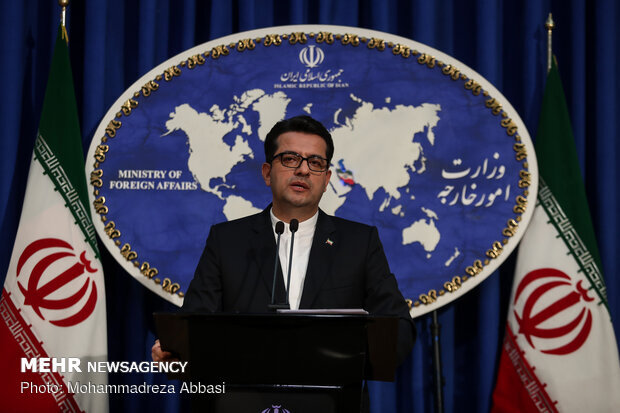Iran to take second step in limiting nuclear commitments ‘more strongly’

TEHRAN - Foreign Ministry spokesman Abbas Mousavi said on Monday that Iran will take the second step in reducing its commitments under the 2015 nuclear deal “more strongly”.
On May 8, Supreme National Security Council (SNSC) declared Tehran’s partial withdrawal from the nuclear deal commitments in response to the U.S. exit from the multilateral pact and reimposition of sanctions on Iran.
The decision by Tehran was taken one year after the U.S. ditched the agreement endorsed by the UN Security Council Resolution 2231.
Under the nuclear agreement, officially called Joint Comprehensive Plan of Action (JCPOA), Iran is tasked to put caps on its nuclear activities in exchange for termination of economic and financial sanctions.
Iran has insisted that it cannot remain unilaterally committed to the deal.
“We will continue reducing our commitments as long as no practical step is taken to meet Iran’s legal demands within the framework of the JCPOA. If they do not take any action in a few days, we will take second step more strongly,” Mousavi told a regular news briefing.
Mousavi said that survival of the JCPOA depends on the remaining signatories’ commitments to their obligations.
The remaining parties to the JCPOA are the European Union, E3 – Germany, France and Britain – Russia and China.
Iran threatened to step up uranium enrichment if an agreement is not made within 60 days to protect it from the sanctions’ effects. The deadline ends on July 7.
In line with Tehran’s decision to scale back its commitments under the nuclear deal, the Atomic Energy Organization of Iran (AEOI) announced on June 17 that Iran’s stockpile of enriched uranium will exceed 300 kilograms by June 27.
After June 27, Kamalvandi said, Iran will speed up its uranium enrichment activities beyond 3.67 percent if the remaining sides don’t take a practical step.
“After surpassing 300 kilogram, we will increase the speed of producing enriched uranium above 3.67 percent,” Kamalvandi stated.
Iran has insisted it will reverse its decision if it is shielded from sanctions.
‘Iran does not want superficial INSTEX’
Mousavi also said INSTEX, a European special purpose vehicle aimed at facilitating legitimate trade between European economic operators and Iran, should be not be “artificial”.
He went on to say that Iran’s oil revenues should reach the amount before the U.S. withdrawal from the JCPOA.
On January 31, France, Germany and Britain, announced the creation of INSTEX. On March 20, Iran’s central bank governor Abdolnaser Hemmati also announced that a mechanism similar to INSTEX has been registered in Iran, officially called the Special Trade and Finance Institute (STFI).
During a joint press conference with Foreign Minister Mohammad Javad Zarif in Tehran on June 10, German Foreign Minister Heiko Maas said, “We make efforts to make it possible to have economic cooperation with Iran. A financial mechanism called INSTEX has been devised in this respect.”
Iranian Parliament Speaker Ali Larijani recently told a top French parliamentarian that INSTEX “remains on the paper”.
Kamal Kharrazi, chief of the Strategic Council on Foreign Relations, also told the visiting British Minister of State for the Middle East on Sunday that London’s talks of the JCPOA are “repeated words”.
‘Iran not to surrender to pressure’
Mousavi also reiterated long-held position by Iran that Tehran will not surrender to sanctions and pressure, noting maximum pressure against Iran does not work.
Despite incessant harsh sanctions and pressures, President Donald Trump and his close aides are calling for dialogue with Iran. However, Tehran has insisted it will not go to the negotiating table because of the sanctions and pressure.
‘Iran ready for talks with regional countries’
Mousavi also said that Iran has always been ready for talks with regional countries.
“We are even ready to hold talks with neighbors who think differently and we do not reject mediations in this respect,” the Foreign Ministry spokesman said in indirect reference to Saudi Arabia and the UAE who have aligned with the U.S. against Iran.
‘We responded firmly to U.S. violation of Iran’s airspace’
He also said that Iran responded to the U.S. drone’s violation of the Iranian airspace “firmly”, maintaining Iran’s full preparedness.
The Islamic Revolution Guards Corps (IRGC) shot down an unmanned U.S. surveillance drone on Thursday morning after it breached Iran’s airspace. The IRGC brought the drone down by firing a surface-to-air missile at it.
Foreign Minister Mohammad Javad Zarif said on Friday that the U.S. military drone entered the Iranian airspace from the United Arab Emirates (UAE) and it was targeted near Kouh-e Mobarak.
Mousavi calls Britain’s Murrison ‘novice’
On British Minister of State for the Middle East Andrew Murrison’s anti-remarks after his return from Iran, Mousavi said he is “novice” and described his remarks as “unconstructive”.
According to BBC, Murrison has said the UK believes Iran “almost certainly bears responsibility for the attacks” following his visit to Iran on Sunday.
On June 13, two commercial oil tankers were hit in the Gulf of Oman, prompting the evacuation and rescue of dozens of crew members.
The United States has blamed Iran for the attacks.
Hunt also issued a statement on June 14 blaming Iran and the Islamic Revolution Guard Corps for the attacks. He claimed no other state or non-state actor could have been responsible. The UK official, however, did not present any evidence for his claim.
On June 15, the Iranian Foreign Ministry summoned British Ambassador Robert Macaire over the accusations.
Assistant Foreign Minister for Europe Mahmoud Barimani conveyed Tehran’s strong protest to the British government’s “unfounded allegations” and “unacceptable” anti-Iran stances.
NA/PA

Leave a Comment